Discussing Education, Libraries and FOSIL With Elizabeth Hutchinson
Home › Forums › The nature of inquiry and information literacy › Discussing Education, Libraries and FOSIL With Elizabeth Hutchinson
- This topic has 16 replies, 2 voices, and was last updated 1 year, 1 month ago by
 Darryl Toerien.
Darryl Toerien.
-
AuthorPosts
-
6th July 2023 at 11:08 am #80838
On 3 June, Elizabeth Hutchinson and I met for the first in a series of monthly discussions about education, school libraries and FOSIL-based inquiry.
The purpose of the series is twofold.
Firstly, it is an informal opportunity to share ongoing developments to FOSIL as a means through which the school library becomes integral to the educational process. These ongoing developments are the result of an ever-deepening understanding of inquiry as a learning process that is aimed at students acquiring important curriculum content in and across all subject areas. An important source of growing insight into this learning process and its implementation arises out of my weekly discussions with Barbara Stripling.
Secondly, it is an informal opportunity to explore the growing number of resources that are available to support FOSIL-based inquiry, both curricular and extracurricular, most of which are freely available from the FOSIL Group site.
The recording of this discussion is freely available here on Elizabeth’s site.
6th September 2023 at 5:10 pm #81308On 28 July, Elizabeth Hutchinson and I met for the second in a series of monthly discussions about education, school libraries and FOSIL-based inquiry.
The recording of this discussion is freely available here on Elizabeth’s site.
12th September 2023 at 5:28 pm #81363On 9 September, Elizabeth Hutchinson and I met for the third in a series of monthly discussions about education, school libraries and FOSIL-based inquiry.
The recording of this discussion is freely available here on Elizabeth’s site.
8th October 2023 at 4:11 am #81462On 5 October, Elizabeth Hutchinson and I met for the fourth in our ongoing monthly discussion about education, school libraries and FOSIL-based inquiry.
The recording of this discussion is freely available here on Elizabeth’s site.
12th November 2023 at 2:31 pm #81811On 11 November, Elizabeth Hutchinson and I met for the fifth in our ongoing monthly discussion about education, school libraries and FOSIL-based inquiry.
The recording of this discussion is freely available here on Elizabeth’s site.
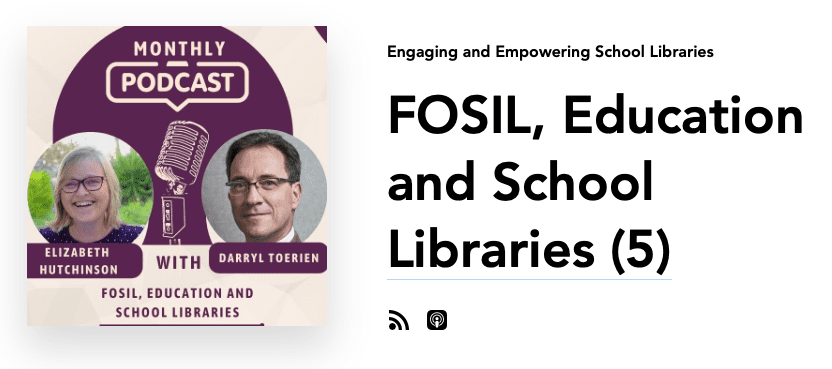 4th March 2024 at 11:08 am #82657
4th March 2024 at 11:08 am #82657My apologies for not updating this:
- On 9 December 2023, Elizabeth Hutchinson and I met for the Sixth in our ongoing monthly discussion about education, school libraries and FOSIL-based inquiry. Listen here.
- On 13 January 2024, Elizabeth Hutchinson and I met for the Seventh in our ongoing monthly discussion about education, school libraries and FOSIL-based inquiry. Listen here.
- On 3 February 2024, Elizabeth Hutchinson and I met for the Eighth in our ongoing monthly discussion about education, school libraries and FOSIL-based inquiry. Listen here.
Elizabeth and I next meet on Saturday 9 March 2024.
16th March 2024 at 3:08 pm #82823On 9 March 2024, Elizabeth Hutchinson and I met for the Ninth in our ongoing monthly discussion about education, school libraries and FOSIL-based inquiry. Listen here.
15th April 2024 at 8:00 am #83036On 13 April 2024, Elizabeth Hutchinson and I met for the 10th in our ongoing monthly discussion about education, school libraries and FOSIL-based inquiry.
This week we discussed the history of UK school libraries from 1937 to 1986, although this history does not unfold in isolation from developments elsewhere.
Listen to this episode here, and listen to the rest of the series here.
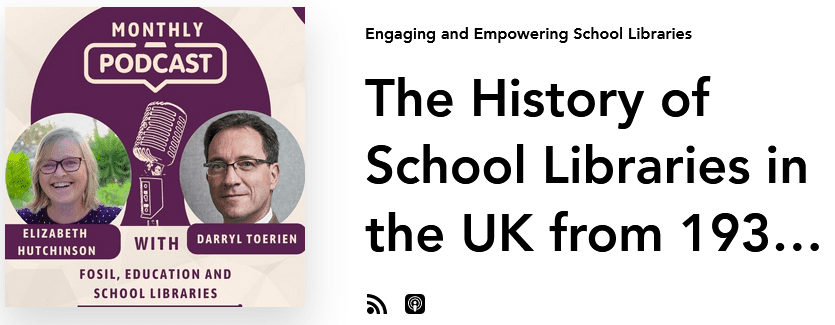 2nd July 2024 at 12:37 pm #83830
2nd July 2024 at 12:37 pm #83830I have been poor at updating this topic, which I apologise for.
Elizabeth Hutchinson has moved the podcast collection onto its own platform, which will make it easier to link to: FOSIL, Education and School Libraries.
Since the previous post, we have discussed the history of UK school libraries from 1986 to 2024 (27 April), and reflected on a year of discussions (27 May).
Our next discussion is planned for 6 July, when we will be looking ahead to some very exciting developments.
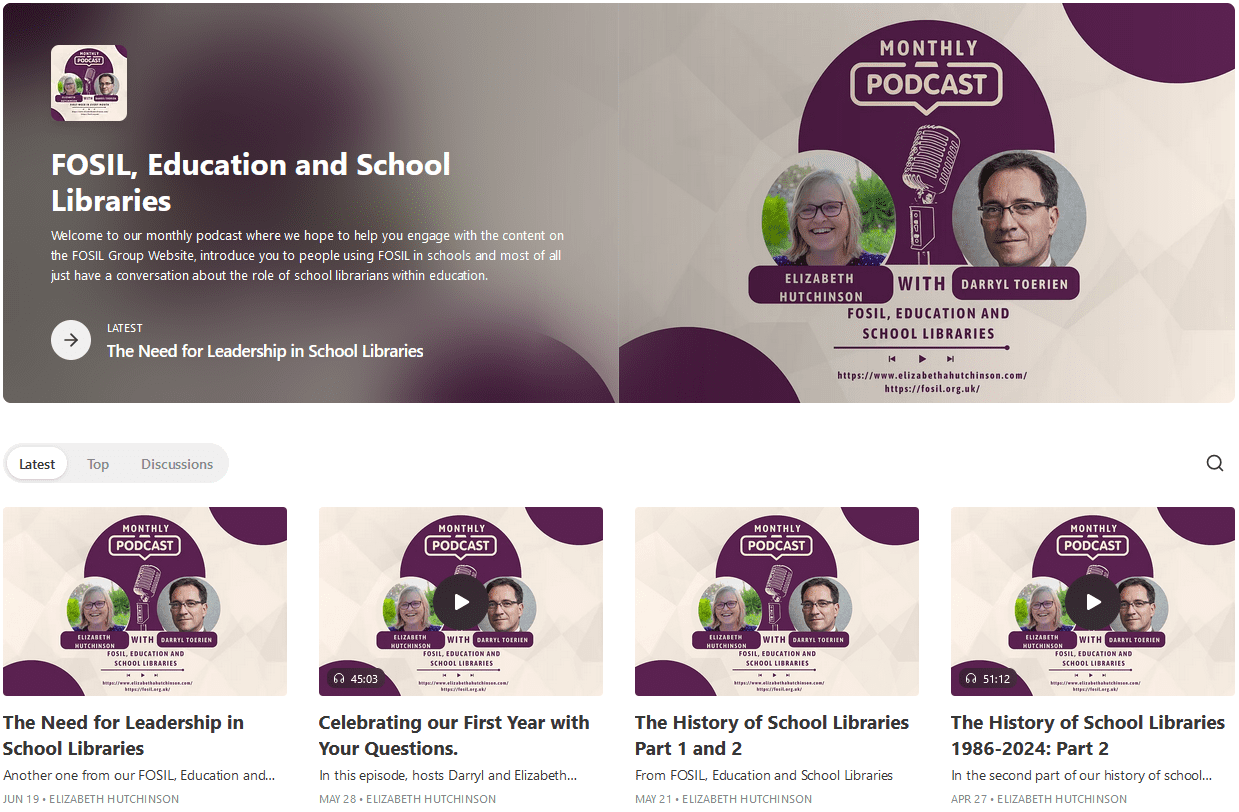 16th August 2024 at 11:33 am #84222
16th August 2024 at 11:33 am #84222After some illness and recuperation, Episode 13 of FOSIL, Education and School Libraries, in which we look ahead to some exciting developments in the coming academic year.
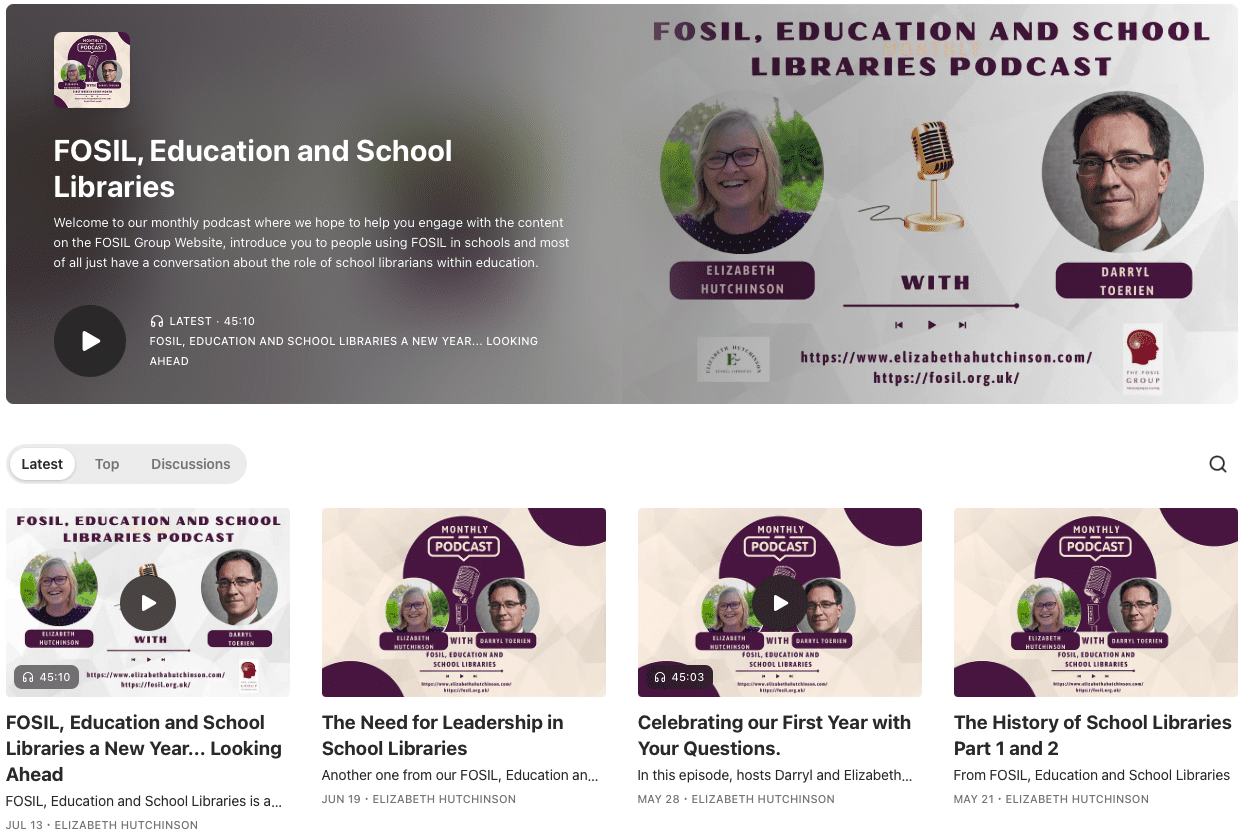 26th October 2024 at 1:28 pm #84809
26th October 2024 at 1:28 pm #84809Episode 15 (and Episode 14) now available.

One of the things Elizabeth and I touch on is the problem of how what a school does, particularly in the classroom, combines to actually achieve what a school claims to aim to do.
Inquiry has as its end engaged and empowered inquirers, the attributes of whom are developed systematically and progressively through inquiry (see below), which is directed at acquiring disciplinary knowledge in an interdisciplinary way. These attributes, therefore, describe the emergence of a certain type of learner – a Heroic Inquirer in the terms of our work on aligning the stages of the information-to-knowledge learning journey (see, for example, the IFLA School Library Guidelines) with the hero’s life journey (see, for example, The Hero with a Thousand Faces). An exciting focus of our recent work at Blanchelande is mapping the attributes of a Heroic Inquirer to the type of character that a Blanchelande education aims to develop, which makes it increasingly clear that inquiry – properly understood and supported – enables the classroom both to achieve its aims in terms of acquiring knowledge and contribute directly to the school achieving its aims in terms of developing a certain type of person.
It is worth reflecting on this from the perspective of Jacques Maritain’s profound observation: “Nothing is more important than the events which occur within that invisible universe which is the mind of [a person]. And the light of that universe is knowledge. If we are concerned with the future of civilization we must be concerned primarily with a genuine understanding of what knowledge is, its value, its degrees, and how it can foster the inner unity of the human being.” (The Range of Reason, 1952, p. 3)
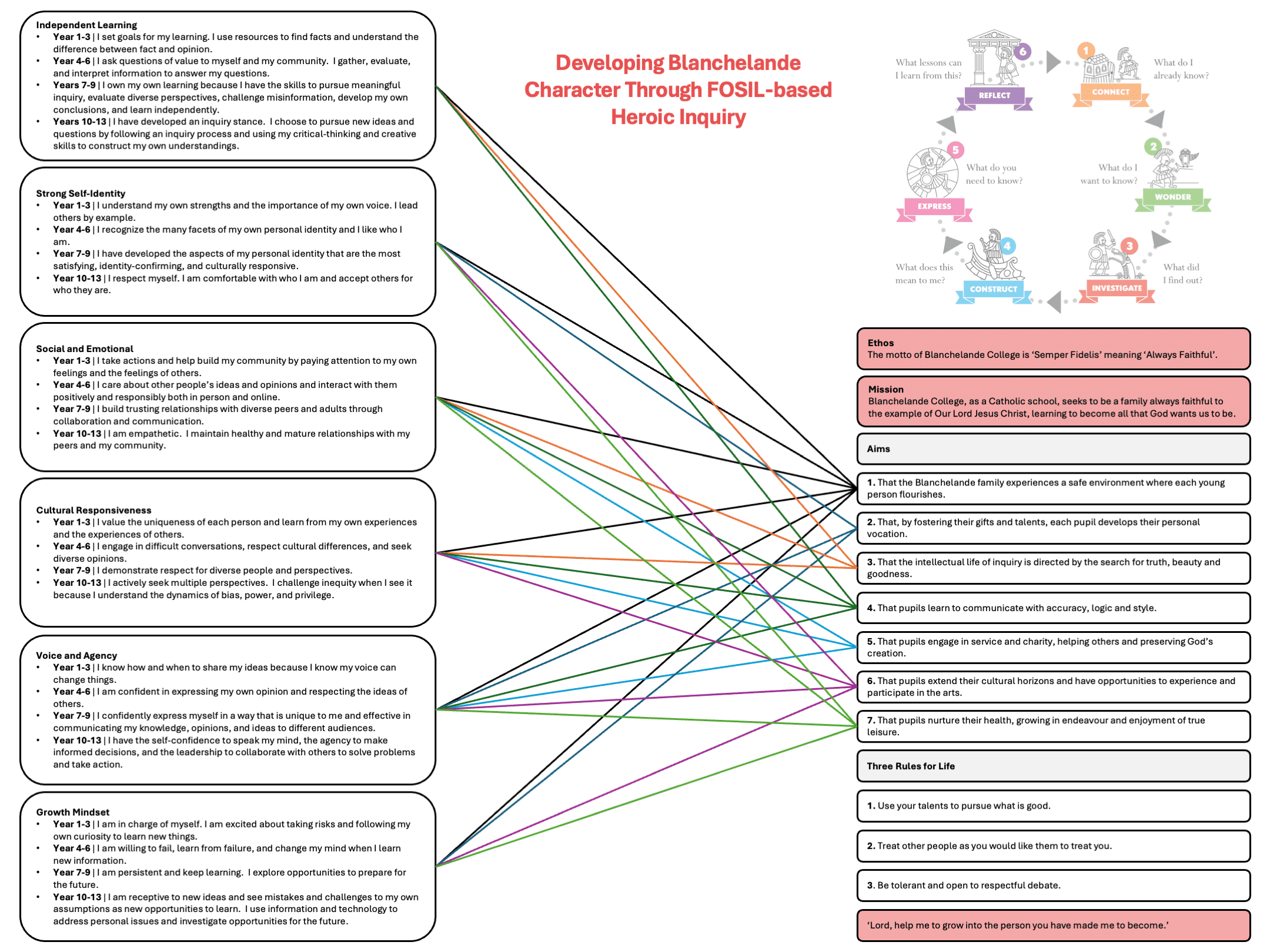 26th October 2024 at 5:59 pm #84813
26th October 2024 at 5:59 pm #84813Hi Darryl, I have posted this question on LinkedIn too but thought it would be good to discuss it here. Schools talk about their pedagogy and I was wondering if we are saying that FOSIL is a pedagogy? I was talking to my son about the Tridium method of Grammar, Logic and Rhetoric… when he was talking about it I thought it sounded similar to the philosophy of FOSIL… is my thinking going in the right direction?
27th October 2024 at 6:59 am #84814Ok, I have just been re-reading your ACCESS article and in your first paragraph you say that it is a pedagogical model… that is a relief… I need to discuss this more with you as I have just begun to understand what we are talking about…. Maybe our next podcast!
29th October 2024 at 10:50 am #84818Sorry, Elizabeth, I missed your posts here, so have copied across my replies from LinkedIn.
—
I have added our latests podcast (see above), with further thoughts on the problem of how what a school does, particularly in the classroom, combines to actually achieve what a school claims to aim to do. In conclusion, it is “increasingly clear that inquiry – properly understood and supported – enables the classroom both to achieve its aims in terms of acquiring knowledge and contribute directly to the school achieving its aims in terms of developing a certain type of person.
I am familiar with the Trivium & Quadrivium in the context of a classical liberal education: Trivium being grammar, logic, & rhetoric; Quadrivium being arithmetic, astronomy, music, & geometry. In this sense, they are subjects/disciplines. On some level, the content of the Trivium is relevant to the inquiry process, e.g., rhetoric in Express. Maritain, who we discussed on Saturday, makes a compelling and more helpful case for a contemporary liberal education (1967!), which “drastically revises the classical and medieval seven liberal arts, the Trivium and the Quadrivium, in order to provide for the vast development of knowledge [and the technological environment and means for producing it] in recent times and at the same time preserve the liberal character of education…On the level of universal knowledge…the liberal arts must be reintegrated so as to comprehend, as they once did, the physical sciences, the human sciences, the literary disciplines, and philosophy. The physical sciences, and others patterned upon them, must regain their humanistic character.” (pp. 17-18)
Maritain describes a contemporary liberal education as “fully human education…preparing the youth to exercise their power to think in a genuinely free and liberating manner—that is to say…it equips them for truth and makes them capable of judging according to the worth of evidence, of enjoying truth and beauty for their own sake, and of advancing, when they have become adults, toward wisdom and some understanding of those things which bring to them intimations of immortality” (1952, p. 3). The process of coming to know and understand reality on the strength of evidence is inquiry, which is why inquiry is a distinguishing feature of a contemporary liberal education. Maritain terms this freedom terminal freedom —“the fulfillment of the deepest potentialities of the human being in the world” (1967, p. 10), which is reflected in the portraits of an engaged and empowered inquirer (below – download as PNG image) and in my post above).
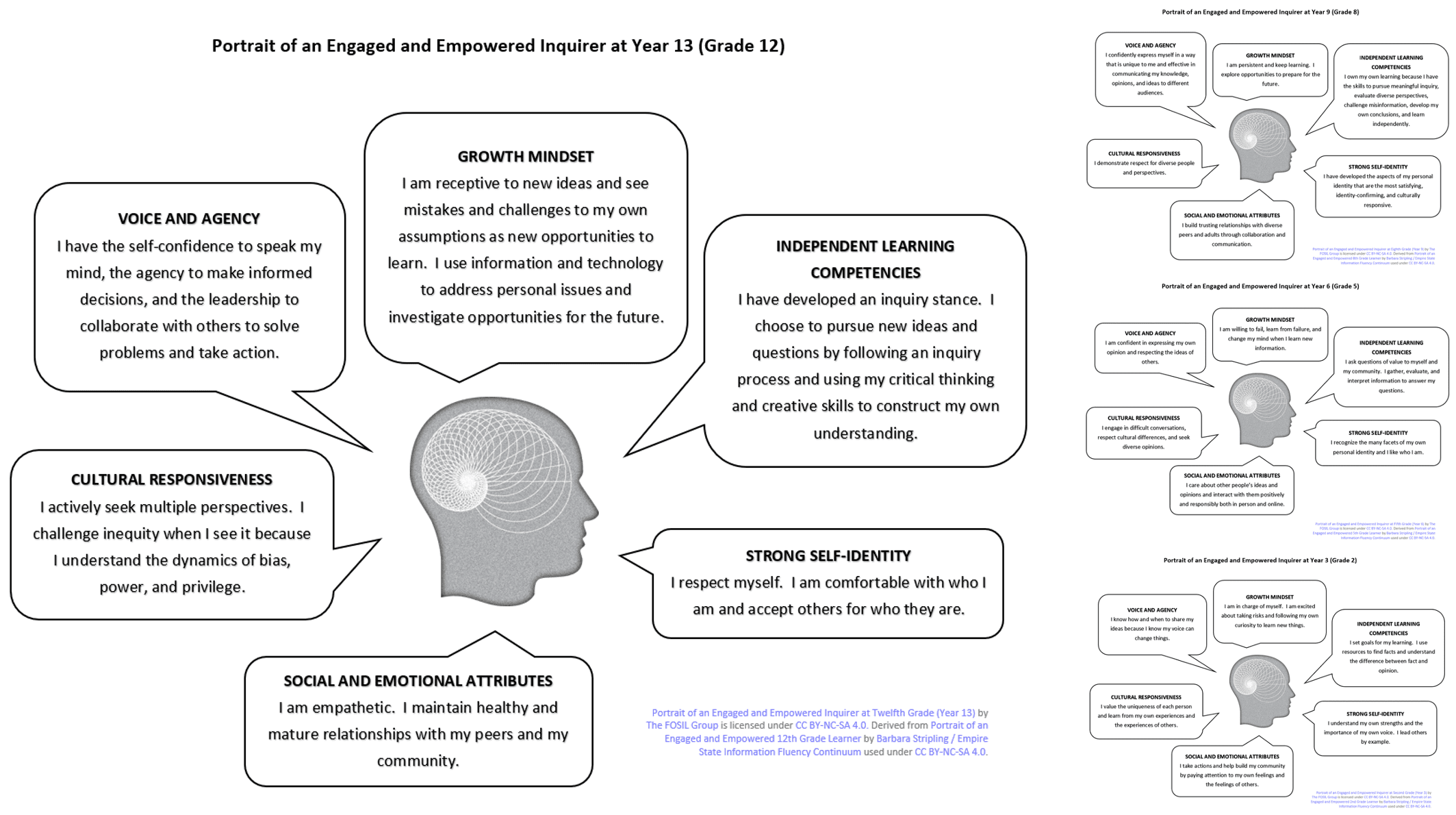 29th October 2024 at 10:54 am #84819
29th October 2024 at 10:54 am #84819Thanks Darryl, I wanted to have a conversation in both places to see if we could get more traction.
I’ve written a very short blog post that helped my thought process… I have lots to work on going forward… Here is the link https://www.elizabethahutchinson.com/post/bringing-fosil-and-school-pedagogy-together-a-new-vision-for-inquiry-based-learning
-
AuthorPosts
- You must be logged in to reply to this topic.



